Computer Engineering Department
About the Department of Computer Engineering
Computer Engineering is a branch of engineering that includes the applications of algorithmic processes encountered in the field of hardware and software. It also provides solutions to problems encountered in technological, economic, scientific and social fields. There are four main areas in which students are trained in this discipline: theory, abstraction, design and practice. Theory provides the mathematical and scientific background of computing. Abstraction involves the principles of modeling algorithms, data structures, hardware architecture. Design and practice refers to the use of tools and theory necessary for the development of hardware-software systems. These tools include programming languages, databases, network protocols, client/server architecture, artificial intelligence, etc.
Computer Engineering programs include courses in basic sciences, basic engineering, social sciences and computer science. The foundation of Computer Engineering is provided by courses in theory, programming, computer organization, numerical design, numerical analysis, algorithms and data structures. In advanced classes, operating systems design, database applications, computer graphics, computer architecture, microprocessors, programming languages, object-oriented programming methods and software engineering are covered. Final year students combine their creativity, knowledge and motivation with the latest technology to prepare a final project.
You can review this page for Yeditepe University Faculty of Engineering Computer Engineering Department YKS quotas, base points and success ranking.
You can review this page for the 2024 - 2025 academic year tuition fees of Yeditepe University Faculty of Engineering, Department of Computer Engineering.
The Department of Computer Engineering offers scholarships to students who are successful in ranking and scoring. Here you can get information about both the scholarship programs of the department and the general scholarship opportunities of Yeditepe University.
The Department of Computer Engineering of our university aims to train computer engineers who have knowledge in the fields of science and mathematics as well as computer engineering and who can use the theoretical and practical knowledge they have received during their undergraduate education to solve problems by transferring them to the field of engineering. At the same time, engineering students should be aware of the global security and environmental impacts of these applications.
Our department, which has been continuously accredited by the European accreditation body MÜDEK (Association for Evaluation and Accreditation of Engineering Education Programs) since 2008, provides education in accordance with international standards. In this sense, students are given theoretical and practical training on computer networks, hardware basics and software, and thanks to the 8 general purpose and 10 special purpose laboratories within the department, students can conduct research and develop projects according to their fields of interest.
Students who can double major in many different undergraduate programs can receive a second diploma. In this sense, graduates of our department have the opportunity to work in different sectors as well as computer engineering.
Our department produced a total of 1081 graduates between 2000-2022.
Continuation of Graduates to Graduate Studies
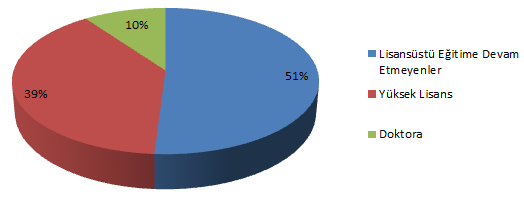
Academic Graduates
Examples of the universities whereour graduates received graduate educationabroad (click on it to see a larger version):
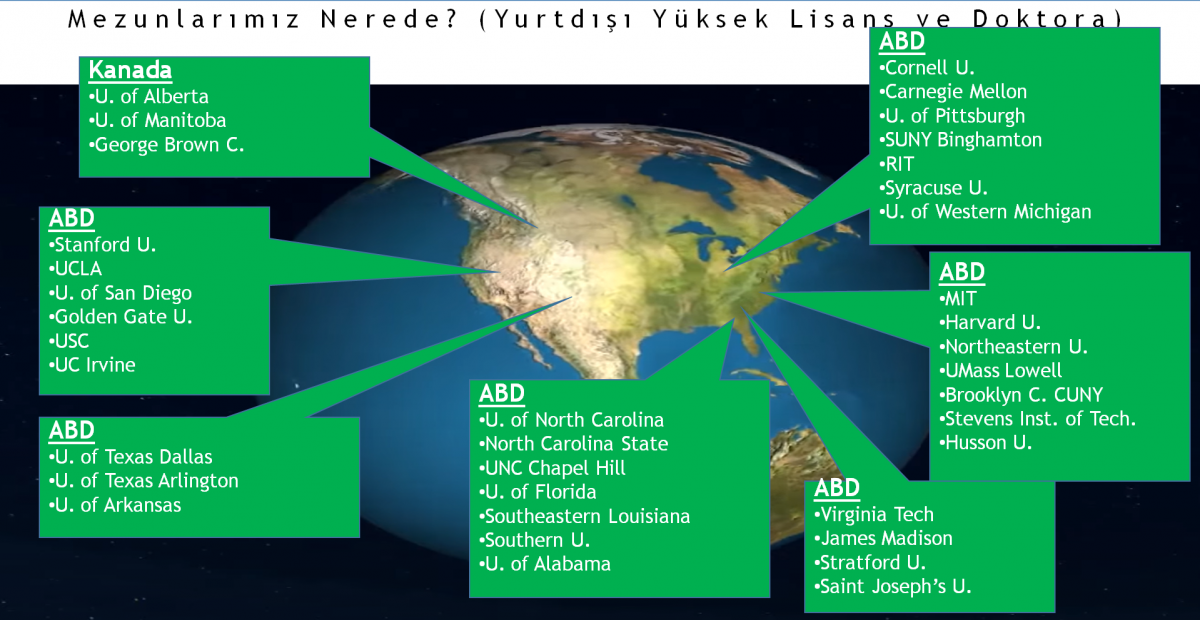
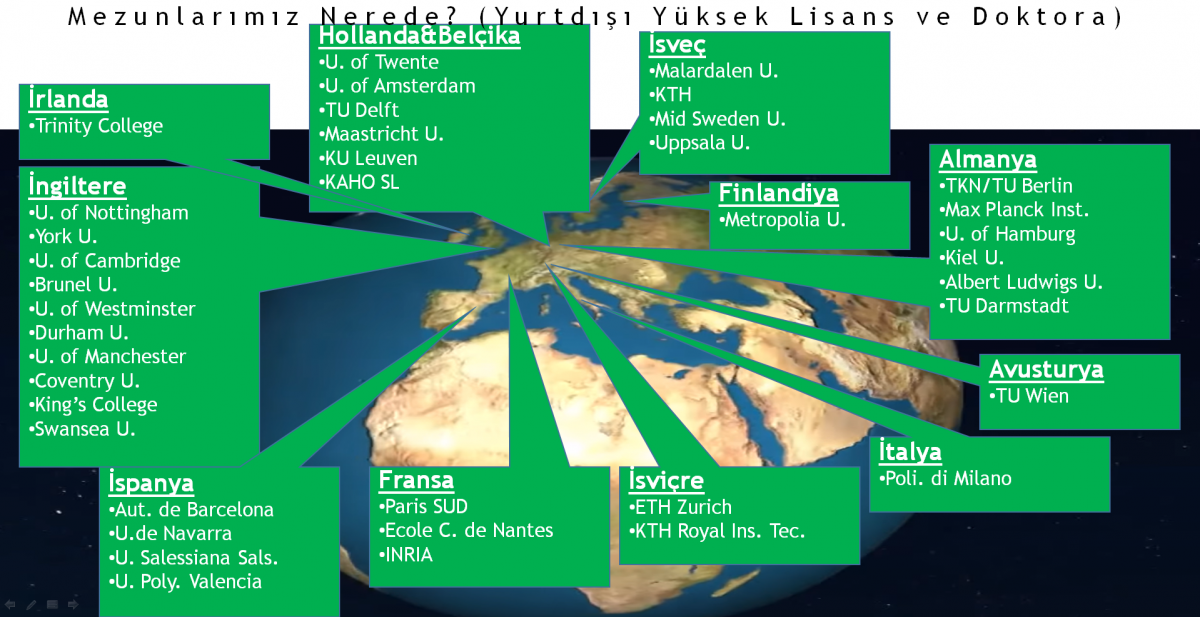
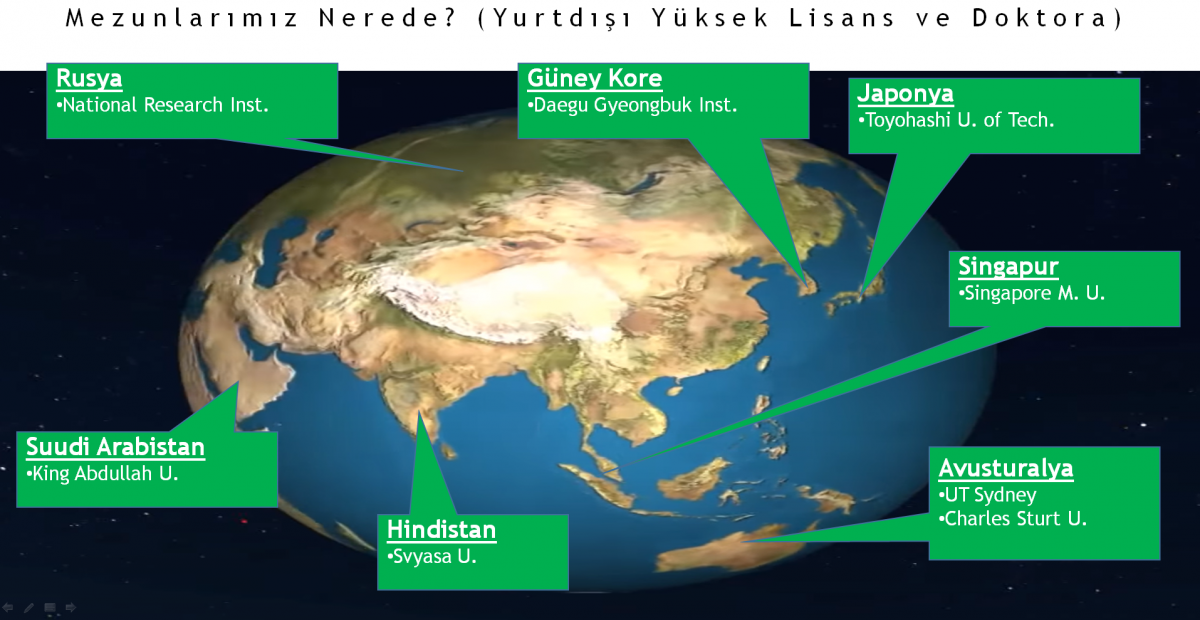
Sectoral Distribution of Our Graduates
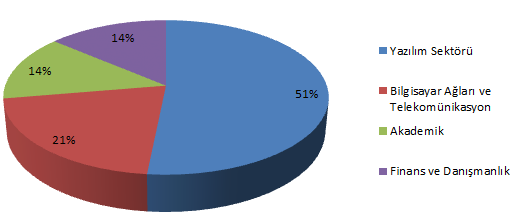
Employment Process of Our Graduates
According to the results of the surveys prepared within the framework of the requirements of Engineering (MÜDEK) accreditation and answered by our graduates participating in the graduate-student meetings, our graduates do not have any difficulty in finding a job after graduation. The graph below is based on the responses of our graduates to the question "Have you ever been unemployed after graduation?"
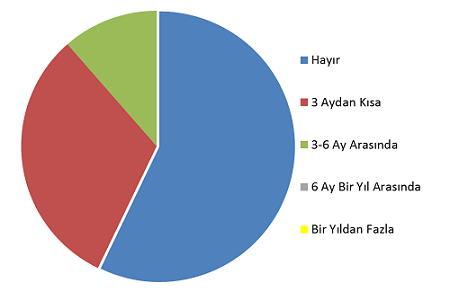
Careers of Our Graduates
Examples of companies where our graduates have worked abroad (click on the image to see a larger version):
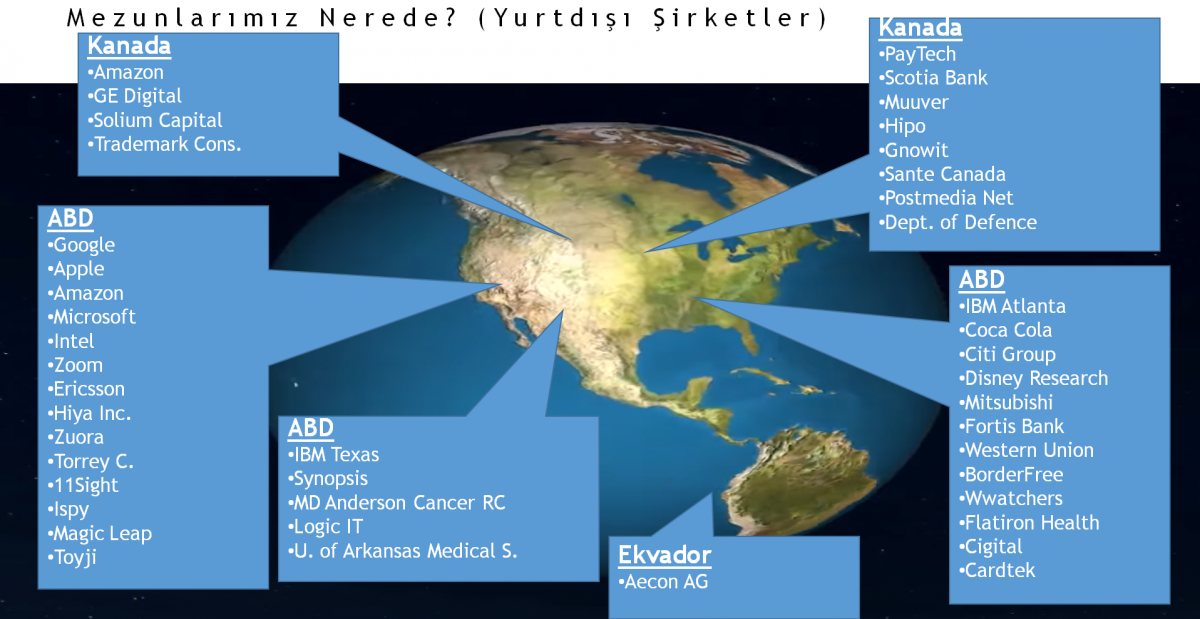
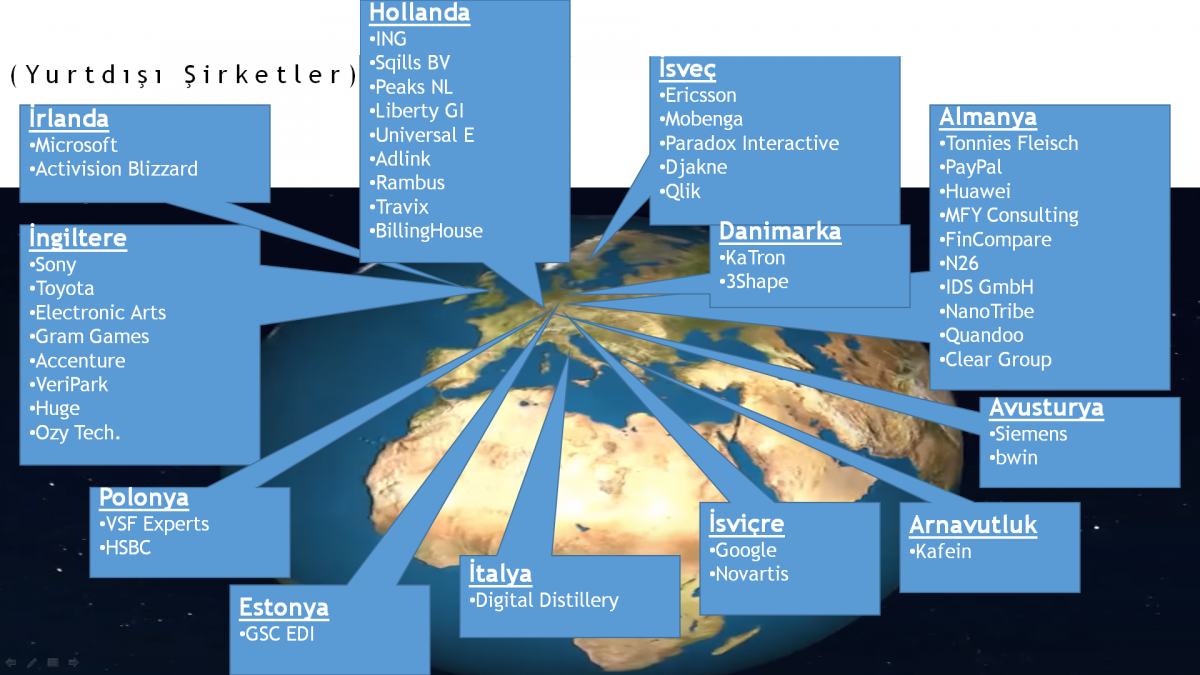
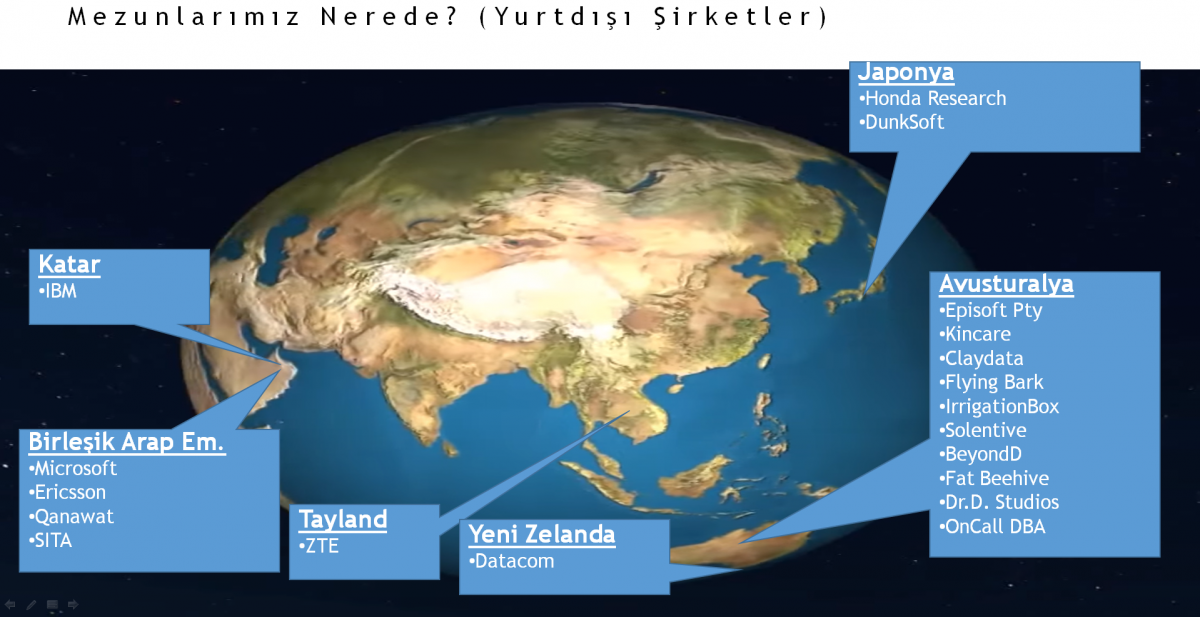
Our academic graduates who became faculty members:
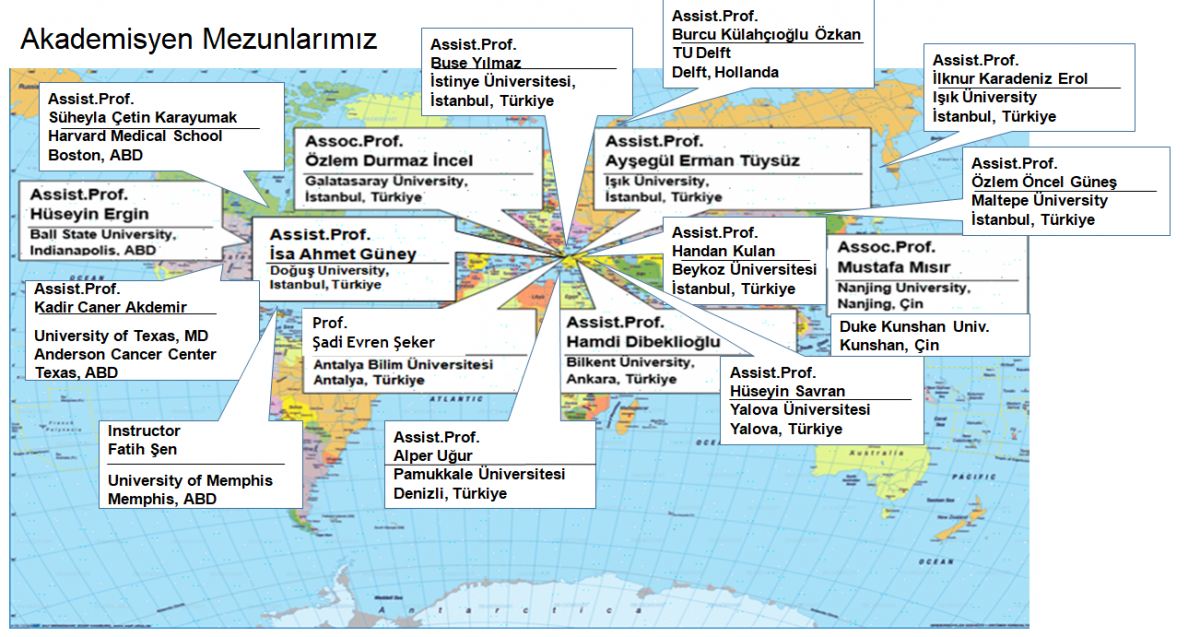
Vision
To be the top ranked computer engineering department in the world with world-renowned scientists and equipped with advanced research laboratories and to train world-class scientists.
Mission
To conduct research with a rich academic staff specialized in their subjects and to train world-renowned computer engineers who are capable of solving engineering problems with systematic methods, who can keep up with rapidly developing technologies, who are prone to interdisciplinary teamwork, and who are free from the phenomenon of being taught.
Undergraduate Education Objectives
Our Graduates
- Technically qualified engineers who are open to research and innovation.
- Demonstrate competence in both software and hardware.
- Should be able to take responsibility and have a sense of professionalism.
Undergraduate Program Outcomes
|
1 |
Adequate knowledge in mathematics, science and computer engineering discipline-specific subjects; ability to use theoretical and applied knowledge in these areas to solve complex engineering problems. |
|
2 |
Ability to identify, formulate and solve complex computer engineering problems; ability to select and apply appropriate analysis and modeling methods for this purpose. |
|
3 |
Ability to design a complex system, process, device or product under realistic constraints and conditions to meet specific requirements; ability to apply modern design methods for this purpose. |
|
4 |
Ability to select and use modern techniques and tools needed for analysis and solution of complex problems encountered in computer engineering applications; ability to use information technologies effectively. |
|
5 |
Ability to design experiments, conduct experiments, collect data, analyze and interpret results for the investigation of complex computer engineering problems or discipline-specific research topics. |
|
6 |
Ability to work effectively in disciplinary and multidisciplinary teams; ability to work individually. |
|
7 |
Ability to communicate effectively both orally and in writing; knowledge of at least one foreign language; ability to write effective reports and understand written reports, prepare design and production reports, make effective presentations, give and receive clear and understandable instructions. |
|
8 |
Awareness of the necessity of lifelong learning; the ability to access information, to follow developments in science and technology and to continuously renew oneself. |
|
9 |
Knowledge about acting in accordance with ethical principles, professional and ethical responsibility and standards used in engineering practices. |
|
10 |
Knowledge about business life practices such as project management, risk management and change management; awareness of entrepreneurship, innovation; knowledge about sustainable development. |
|
11 |
Knowledge about the global and societal effects of computer engineering applications on health, environment and safety and contemporary issues reflected in the field of computer engineering; Awareness of the legal consequences of computer engineering solutions. |
Yeditepe Students
Students with a cumulative grade point average (CGPA) of 2.20 and above, who have completed at least one academic semester at Yeditepe University and will continue at Yeditepe University for at least one more semester in order to graduate upon their return, may apply to continue their education abroad for one semester through Erasmus or exchange programs.
Erasmus agreements are made between departments. Exchange agreements are university-wide and are limited to quotas announced by the international office. You can get information about the schools we have agreements with from the department Erasmus/Exchange coordinator. Application dates for each semester are announced by the International Office and announced in our department. Click here for detailed information and application.
Shortly after your application, you will be required to take a language test. The date of the exam is announced by the International Office, you need to follow it. Students who score at least 60 points in the language exam will take an oral exam on a date determined by the department Erasmus/Exchange coordinator. Your status is determined according to your success score and the quota for the school you want to attend. Following this, you can find all the forms you need to fill out and the procedures you need to do on the international office's page.
The financial status of the student who goes abroad for a semester with any exchange program continues at the University. Erasmus students are also provided with some financial support under the name of grant. The amount of this is announced by the International Office. Students can waive the financial support if they wish.
You can access the most up-to-date list of ERASMUS connections of our department from the International Office Agreements page (The link to the Agreements page is https://international.yeditepe.edu.tr/en/international/agreements/agreements). Negotiations for new agreements are ongoing. In addition, new agreements can be made with the requests and initiatives of students.
ERASMUS Coordinator
Prof. Dr. Lecturer Member Tacha Serif
1470 A-409
Minor
-
Candidates from other departments of Yeditepe University who wish to minor in Computer Engineering must take at least 7 courses that are not in their major. The courses required for a minor in Computer Engineering are listed below.
-
A minor in Computer Engineering requires a minimum of 23 credits.
-
CSE 114 is a prerequisite for many courses in the minor. For minor students, ES 112 Algorithms and Programming (4 credits) is considered equivalent to CSE 114. If the student has not taken ES 112 before, he/she must take this course before starting the minor.
-
If the minor student has already taken a course or its equivalent in the minor program or if it is a required course of his/her major, he/she must take another CSE coded course instead of that course.
-
Each minor student will have an advisor from the Department of Computer Engineering.
Minor Program
|
Course Code |
Course Name |
Credits |
ECTS |
Prerequisite |
|
CSE 211 |
Data Structures |
4 |
6 |
CSE 114 |
|
CSE 221 |
Principles of Logic Design |
4 |
6 |
|
|
CSE 232 |
Systems Programming |
3 |
6 |
CSE 114 |
|
CSE 323 |
Computer Organization |
3 |
6 |
CSE 221, CSE 232 |
|
CSE 341 |
File Organization |
3 |
5 |
CSE 211 |
|
CSE 344 |
Software Engineering |
3 |
6 |
CSE 211 |
|
CSE 351 |
Programming Languages |
3 |
6 |
CSE 114 |
Double Major
The double major program allows students pursuing an undergraduate program to obtain a second undergraduate degree by fulfilling certain requirements. Students pursuing a double major program complete the total credits required for graduation in both majors, and fulfill the other requirements of these programs. Double major programs are determined separately for each department. Department of Computer Engineering's double major programs are given in the list below.
-
-
Mechanical Engineering
-
Electrical and Electronics Engineering
-
Industrial and Systems Engineering
-
Genetics and Bioengineering
-
Biomedical Engineering
-
Civil Engineering
-
Mathematics
-
Chemical Engineering
-
Food Engineering
Minor - Double Major Coordinator
Esin Onbaşıoğlu
Office: A-405
Phone: +90 216 578 04 22
Email: esin [at] cse.yeditepe.edu.tr -
Internship Period
Compulsory internship period is at least 20 working days without interruption. If the company is open on Saturdays, these days also are accepted as working days. It is forbidden to register to any course during the internship. Internship cannot overlap with the semester even a single day.
Internship Focus
Internship may focus on software or hardware areas. The student is expected to work in a project, make a design, develop a software or a hardware, and observe the management of a project.
Internship Position
Finding an internship position is the responsibility of the student. A limited list of company names and contact information is also available in the department secretariat. There must be at least one Computer Engineer in the company in the department of internship. If the strudent’s application is approved by the department, the student applies for the internship insurance. Students can start their internship after the insurance procedure is completed.
Insurance
Insurance is mandatory. Internships without insurance will not be accepted. All documents required for insurance must be delivered to the department secretariat at least 1 month before the starting date of your internship.
Internship Requirements
Internship is mandatory for graduation. Internship must be done at the end of the 3rd year. Requirements for the internship are:
- The student must have completed 100 credits or more;
- OR the student must have passed all CSE courses in the 3rd year of the curriculum;
- OR the student might graduate within one year, considering his/her CGPA and the prerequisites and semesters of the courses he/she will take
After completing the internship, students must register to CSE 400 in the fall semester.
Students who do not satisfy the above requirements are encouraged to do voluntary internships. At the end of a voluntary internship, students do not submit a report and they do not register to CSE 400 course.
Internship Report
It is compulsory to write an internship report. All activities during the internship should be recorded in this report. The project that you are assigned, the software or hardware that you developed, and the knowledge you gained during the internship must be explained in detail. Each page of the report should be signed and stamped by your supervisor and the company. The report must be written on computer. Deadline for report submission is the first week of the following semester.
Internship Evaluation Form
At the end of your internship, internship evaluation form should be filled, signed and stamped by your supervisor and should be delivered to the department in a closed envelope.
Evaluation
After the evaluation of your Internship Report and Internship Evaluation Form, your CSE 400 grades will be determined as either P (pass) or F (fail).
Application Forms
Internship Application Forms to be submitted to the department:
Form to be requested from the company
Internship Coordinator
Lecturer Gülşah Gökhan Gökçek
Office: B-438/B
E-Mail: ggokcek@cse.yeditepe.edu.tr
Tel: +90(216) 578 04 20
As of 2024, you can access the curriculum from the link below.
Aims and Objectives
- Aim: To train computer engineers who are capable of conducting research and solving engineering problems with systematic methods, who can keep up with rapidly developing technologies, who are prone to interdisciplinary teamwork, and who are free from the phenomenon of being taught with a rich academic staff specialized in their fields.
- Goal: Our goal is for our graduates to be technically qualified engineers who have the ability to research, learn and solve problems; who can demonstrate competence in both software and hardware areas; who can take responsibility and have a sense of professionalism.
Program Learning Outcomes
1 Adequate knowledge in mathematics, science and computer engineering discipline-specific subjects; ability to use theoretical and applied knowledge in these areas to solve complex engineering problems. 2 Ability to identify, formulate and solve complex computer engineering problems; ability to select and apply appropriate analysis and modeling methods for this purpose. 3 Ability to design a complex system, process, device or product under realistic constraints and conditions to meet specific requirements; ability to apply modern design methods for this purpose. 4 Ability to select and use modern techniques and tools needed for analysis and solution of complex problems encountered in computer engineering applications; ability to use information technologies effectively. 5 Ability to design experiments, conduct experiments, collect data, analyze and interpret results for the investigation of complex computer engineering problems or discipline-specific research topics. 6 Ability to work effectively in disciplinary and multidisciplinary teams; ability to work individually. 7 Ability to communicate effectively both orally and in writing; knowledge of at least one foreign language; ability to write effective reports and understand written reports, prepare design and production reports, make effective presentations, give and receive clear and understandable instructions. 8 Awareness of the necessity of lifelong learning; the ability to access information, to follow developments in science and technology and to continuously renew oneself. 9 Knowledge about acting in accordance with ethical principles, professional and ethical responsibility and standards used in engineering practices. 10 Knowledge about business life practices such as project management, risk management and change management; awareness of entrepreneurship, innovation; knowledge about sustainable development. 11 Knowledge about the global and societal effects of computer engineering applications on health, environment and safety and contemporary issues reflected in the field of computer engineering; Awareness of the legal consequences of computer engineering solutions.
Öğretim Metotları
Öğretme – öğrenme yöntem ve stratejileri, öğrencilerin kendi kendine çalışma, yaşam boyu öğrenme, gözlem yapma, başkasına öğretme, sunma, eleştirel düşünme, takım çalışması, bilişimden etkin yararlanma gibi becerilerini arttıracak şekilde seçilmektedir.
Ayrıca, öğretim tarzının farklı kabiliyetleri olan öğrencileri destekleyecek biçimde olmasına dikkat edilir.
| Öğretim Yöntemi | Öğrenme Faaliyetleri | Araçlar |
| Ders | Dinleme ve anlamlandırma | Standart derslik teknolojileri, çoklu ortam araçları |
| Laboratuvar | Deney tasarlama, gerçekleme ve test etme, takım çalışması | Bilgisayar ve deney cihazları |
| Problem Çözme | Dinleme, tartışma | Standart derslik teknolojileri |
| Ödev | Araştırma, yaşam boyu öğrenme | Ders kitabı, ders notları, internet |
| Ders projesi | Araştırma, yaşam boyu öğrenme | Ders kitabı, ders notları, internet |
| Seminer | Araştırma – yaşam boyu öğrenme, yazma, okuma, Bilişim, Dinleme ve anlamlandırma, yönetsel beceriler | Standart derslik teknolojileri, çoklu ortam araçları |
| Grup Çalışması | Araştırma – yaşam boyu öğrenme, yazma, okuma, Bilişim, eleştirel düşünme, soru geliştirme, yönetsel beceriler, takım çalışması | İnternet veri tabanları, kütüphane veri tabanları, e-posta, çevrimiçi sohbet, web tabanlı tartışma forumları |
| Konuk Konuşmacı | Dinleme ve anlamlandırma, gözlem/durumları işleme | Standart derslik teknolojileri, çoklu ortam araçları |
| Öğrenci Topluluğu Faaliyetleri / Projeleri | Gözlem/durumları işleme, eleştirel düşünme, soru geliştirme, takım çalışması, Araştırma – yaşam boyu öğrenme, yazma, okuma, yönetsel beceriler, önceden planlanmış özel beceriler |
Müfredat
Birinci Yarıyıl
| KOD | Ders Adı | Kredi | ECTS | Önkoşul |
|---|---|---|---|---|
| Toplam kredi: | 19 | 30 | ||
| AFE 131 | Akademik İngilizce I | 3 | 5 | |
| CSE 101 | Bilgisayar Mühendisliği Kavramları ve Algoritmalar | 4 | 8 | |
| GBE 113 | Temel Biyoloji | 4 | 6 | |
| MATH 131 | Kalkülüs I | 4 | 6 | |
| PHYS 101 | Fizik I | 4 | 6 |
İkinci Yarıyıl
| KOD | Ders Adı | Kredi | ECTS | Önkoşul |
|---|---|---|---|---|
| Toplam kredi: | 19 | 30 | ||
| AFE 132 | Akademik İngilizce II | 3 | 5 | AFE 131 |
| CSE 114 | Bilgisayar Programlamanın Temelleri | 5 | 7 | CSE 101 |
| MATH 132 | Kalkülüs II | 4 | 6 | MATH 131 |
| MATH154 | Ayrık Matematik | 3 | 7 | |
| PHYS 102 | Fizik II | 4 | 6 | PHYS 101 |
Üçüncü Yarıyıl
| KOD | Ders Adı | Kredi | ECTS | Önkoşul |
|---|---|---|---|---|
| Toplam kredi: | 19 | 30 | ||
| CSE 211 | Veri Yapıları | 4 | 6 | CSE 114 |
| CSE 221 | Mantık Tasarım İlkeleri | 4 | 6 | |
| EE 211 | Elektrik Devreleri | 4 | 7 | |
| HUM 103 | Uygarlık Tarihi | 2 | 3 | |
| MATH 221 | Lineer Cebir | 3 | 6 | |
| TKL 201 | Türk Dili I | 2 | 2 |
Dördüncü Yarıyıl
| KOD | Ders Adı | Kredi | ECTS | Önkoşul |
|---|---|---|---|---|
| Toplam kredi: | 19 | 30 | ||
| CSE 212 | Yazılım Geliştirme Yöntemleri | 3 | 5 | CSE 114 |
| CSE 224 | Sayısal Sistemlere Giriş | 4 | 6 | CSE 221 |
| CSE 232 | Sistem Programlama | 3 | 6 | CSE 114 |
| MATH 241 | Diferansiyel Denklemler | 4 | 6 | MATH 132 |
| MATH 281 | Olasılık | 3 | 5 | MATH 132 |
| TKL 202 | Türk Dili II | 2 | 2 |
Beşinci Yarıyıl
| KOD | Ders Adı | Kredi | ECTS | Önkoşul |
|---|---|---|---|---|
| Toplam kredi: | 16 | 30 | ||
| CSE 311 | Algoritma Analizi | 4 | 7 | CSE 211 |
| CSE 323 | Bilgisayar Organizasyonu | 3 | 6 | CSE 221, CSE 232 |
| CSE 341 | Dosya Organizasyonu | 3 | 5 | CSE 211 |
| CSE 351 | Programlama Dilleri | 3 | 7 | CSE 114 |
| ES 224 | Sinyaller ve Sistemler | 3 | 5 |
Altıncı Yarıyıl
| KOD | Ders Adı | Kredi | ECTS | Önkoşul |
|---|---|---|---|---|
| Toplam kredi: | 16 | 30 | ||
| CSE 331 | İşletim Sistemleri Tasarımı | 4 | 7 | CSE 211, CSE 232 |
| CSE 344 | Yazılım Mühendisliği | 3 | 6 | CSE 211 |
| CSE 348 | Veritabanı Yönetimi Sistemleri | 3 | 5 | CSE 211 |
| CSE 354 | Otomata Teorisi ve Formal Diller | 3 | 6 | MATH154 |
| ES 272 | Sayısal Çözümleme | 3 | 6 | MATH 132 |
Yedinci Yarıyıl
| KOD | Ders Adı | Kredi | ECTS | Önkoşul |
|---|---|---|---|---|
| Toplam kredi: | 18 | 30 | ||
| CSE 400 | Yaz Stajı | 0 | 1 | |
| CSE 471 | Veri İletişimi ve Bilgisayar Ağları | 4 | 8 | ES 224 |
| CSE XX1 | Kısıtlı Seçmeli I | 3 | 5 | |
| CSE XX2 | Kısıtlı Seçmeli II | 3 | 5 | |
| ECON 294 | Mühendisler için İktisat | 3 | 4 | |
| FE XX1 | Serbest Seçmeli I | 3 | 5 | |
| HTR 301 | Atatürk İlkeleri ve İnkılap Tarihi I | 2 | 2 |
Sekizinci Yarıyıl
| KOD | Ders Adı | Kredi | ECTS | Önkoşul |
|---|---|---|---|---|
| Toplam kredi: | 17 | 30 | ||
| CSE 492 | Mühendislik Projesi | 3 | 8 | |
| CSE XX3 | Kısıtlı Seçmeli III | 3 | 5 | |
| CSE XX4 | Kısıtlı Seçmeli IV | 3 | 5 | |
| CSE XX5 | Kısıtlı Seçmeli V | 3 | 5 | |
| FE XX2 | Serbest Seçmeli II | 3 | 5 | |
| HTR 302 | Atatürk İlkeleri ve İnkılap Tarihi II | 2 | 2 |
Toplam: 44 Ders, 143 Kredi, ECTS 240
Güz Döneminde Açılan Teknik Seçmeli Dersler
| KOD | Ders Adı | Kredi | ECTS | Önkoşul |
|---|---|---|---|---|
| CSE 336 | İşletim Sistemi Pratiği | 3 | 5 | CSE 331 |
| CSE 425 | Sayısal Sistem Tasarımı | 3 | 5 | CSE 221 |
| CSE 427 | Bilgisayar Mimarileri | 3 | 5 | CSE 224 |
| CSE 439 | Bilgisayar Güvenliği | 3 | 5 | |
| CSE 443 | Otomotiv Yazılım Mühendisliğine Giriş | 3 | 5 | |
| CSE 445 | Yazılım Testi | 3 | 5 | CSE 212 |
| CSE 462 | Yapay Zekaya Giriş | 3 | 5 | |
| CSE 464 | Veri Bilimi ve Büyük Veri Analizine Giriş | 3 | 5 | |
| CSE 476 | Mobil Sistemlerde Uygulama Geliştirme | 3 | 5 | CSE 212 |
| CSE 480 | Özel Konular: Coğrafi Bilgi Sistemleri | 3 | 5 | CSE 348 |
| CSE 487 | İmaj işleme ve Örüntü Tanıma | 3 | 5 | ES 224 |
Bahar Döneminde Açılan Teknik Seçmeli Dersler
| KOD | Ders Adı | Kredi | ECTS | Önkoşul |
|---|---|---|---|---|
| CSE 315 | Internet Teknolojileri | 3 | 5 | |
| CSE 326 | Gömülü Sistem Programlama | 3 | 5 | |
| CSE 426 | Ses İşleme ve Tanıma | 3 | 5 | |
| CSE 457 | Derleyici Tasarım | 3 | 5 | CSE 354 |
| CSE 464 | Veri Bilimi ve Büyük Veri Analizine Giriş | 3 | 5 | |
| CSE 472 | Eş Zamanlı Programlama | 3 | 5 | CSE 331 |
| CSE 474 | Otomotiv Ağlarına Giriş | 3 | 5 | |
| CSE 477 | Yazılım Mimarisi | 5 | 5 | |
| CSE 483 | Bilgisayar Grafikleri | 3 | 5 | |
| CSE 484 | Sanal Gerçekliğe Giriş | 3 | 5 | |
| CSE 489 | İnsan Bilgisayar Etkileşimi | 3 | 5 |
Ders ile Program Öğrenme Çıktıları İlişkisi
| Ders | Program Öğrenme Çıktısı | ||||||||||
| 1 | 2 | 3 | 4 | 5 | 6 | 7 | 8 | 9 | 10 | 11 | |
| CSE 101 Bilgisayar Müh. Kavramları ve Algoritmalar | X | X | X | X | X | X | |||||
| CSE 114 Bilgisayar Programlamanın Temelleri | X | X | X | X | |||||||
| CSE 211 Veri Yapıları | X | X | X | X | X | ||||||
| CSE 221 Mantık Tasarım İlkeleri | X | X | X | X | X | ||||||
| CSE 232 Sistem Programlama | X | X | X | X | |||||||
| CSE 224 Sayısal Sistemlere Giriş | X | X | X | X | X | X | |||||
| CSE 212 Yazılım Geliştirme Metodolojileri | X | X | X | X | X | ||||||
| CSE 311 Algoritma Analizi | X | X | X | X | X | X | |||||
| CSE 351 Programlama Dilleri | X | X | X | X | X | ||||||
| CSE 323 Bilgisayar Organizasyonu | X | X | X | X | |||||||
| CSE 341 Dosya Organizasyonu | X | X | X | ||||||||
| CSE 331 İşletim Sistemleri Tasarımı | X | X | X | ||||||||
| CSE 354 Otomata Teorisi ve Biçimsel Diller | X | ||||||||||
| CSE 344 Yazılım Mühendisliği | X | X | X | X | X | X | X | X | |||
| CSE 348 Veritabanı Yönetim Sistemleri | X | X | X | X | X | ||||||
| CSE 471 Veri İletişimi ve Bilgisayar Ağları | X | X | X | X | X | ||||||
| CSE 492 Mühendislik Projesi | X | X | X | X | X | X | X | X | X | ||
Ders Kategori Listesi
| Ders Kategori Listesi | AKTS |
| Temel Bilimler | |
| GBE 113 Temel Biyoloji | 6 |
| MATH 131 Analiz I | 6 |
| PHYS 101 Fizik I | 6 |
| MATH 132 Analiz II | 6 |
| PHYS 102 Fizik II | 6 |
| MATH 241 Diferansiyel Denklemler | 6 |
| MATH 221 Linear Cebir | 6 |
| MATH 154 Ayrık Matematik | 7 |
| MATH 281 Olasılık | 5 |
| Mühendislik Bilimleri | |
| EE 211 Elektrik Devreleri | 6 |
| ES 272 Nümerik Analiz | 6 |
| ES 224 Sinyaller ve Sistemler | 5 |
| Temel Bölüm Dersleri | |
| CSE 101 Bilgisayar Mühendisliği Kavramları ve Algoritmalar | 8 |
| CSE 114 Bilgisayar Programlamanın Temelleri | 7 |
| CSE 211 Veri Yapıları | 6 |
| CSE 221 Mantık Tasarımı İlkeleri | 6 |
| CSE 212 Yazılım Geliştirme Yöntemleri | 5 |
| CSE 232 Sistem Programlama | 6 |
| CSE 224 Sayısal Sistemlere Giriş | 6 |
| CSE 351 Programlama Dilleri | 7 |
| CSE 311 Algoritma Analizi | 7 |
| CSE 323 Bilgisayar Organizasyonu | 6 |
| CSE 331 İşletim Sistemi Tasarımı | 7 |
| CSE 341 Dosya Organizasyonu | 5 |
| CSE 344 Yazılım Mühendisliği | 6 |
| CSE 354 Otomata Teorisi ve Biçimsel Diller | 6 |
| CSE 471 Veri İletişimi ve Bilgisayar Ağları | 8 |
| CSE 492 Mühendislik Projesi | 8 |
| CSE 400 Yaz Stajı | 2 |
| Seçmeli Bölüm Dersleri | |
| CSE 336 İşletim Sistemi Pratiği | 5 |
| CSE 427 Bilgisayar Mimarisi | 5 |
| CSE 439 Bilgisayar Güvenliği | 5 |
| CSE 425 Sayısal Sistem Tasarımı | 5 |
| CSE 462 Yapay Zekaya Giriş | 5 |
| CSE 476 Mobil Sistemlerde Uygulama Geliştirme | 5 |
| CSE 484 Sanal Gerçekliğe Giriş | 5 |
| CSE 487 İmaj İşleme ve Örüntü Tanıma | 5 |
| CSE 315 İnternet Teknolojileri | 5 |
| CSE 326 Gömülü Sistem Programlama | 5 |
| CSE 426 Ses İşleme ve Tanıma | 5 |
| CSE 457 Derleyici Tasarımı | 5 |
| CSE 472 Eşzamanlı Programlama | 5 |
| CSE 443 Otomotiv Yazılım Mühendisliğine Giriş | 5 |
| CSE 474 Otomotiv Ağlarına Giriş | 5 |
| CSE 483 Bilgisayar Grafiği | 5 |
| CSE 489 İnsan Bilgisayar Etkileşimi | 5 |
| CSE 480 Özel Konular | 5 |
| Sosyal-Ekonomi-Yönetim Dersleri | |
| HUM 103 Uygarlık Tarihi | 3 |
| ECON 294 Mühendisler için Ekonomi | 4 |
| Bölüm tarafindan onaylanan alan dışı seçmeli ders (2 adet) | 5 |
| Teknik Ingilizce | |
| AFE 131 Akademik İngilizce I | 4 |
| AFE 132 Akademik İngilizce II | 4 |
| YÖK Dersleri | |
| TKL 201 Türk Dili I | 2 |
| TKL 202 Türk Dili II | 2 |
| HTR 301 İnkılap Tarihi I | 2 |
| HTR 302 İnkılap Tarihi II | 2 |
Degree to be obtained
This department is subject to the first stage degree system of 240 ECTS credits in the field of Computer Engineering in higher education.
When the program is successfully completed and the program qualifications are met, a Bachelor's degree in Computer Engineering is obtained.
Admission Requirements
Students who want to enroll in the department must complete the processes / exams determined by ÖSYM within the framework of the academic and legal legislation of the university. A student who has started his/her education in an equivalent program at home or abroad can apply for transfer. Students' applications are examined and evaluated individually before the start of the semester, taking into account the conditions of each student and the degree to which they apply. More detailed information about admission to the University is available in the Institutional Catalog.
Students coming from abroad within the scope of student exchange programs approved by the University and whose conditions are determined by an agreement can take courses within the program. They can take courses offered in English. The student taking the course must have taken the prerequisite courses or their equivalents. All courses in the program curriculum are conducted in English.
Occupational Profiles of Graduates and Transition to Higher Education
Our graduates are working as Software Developers, Software Architects, Test Engineers, Project Managers, Systems Analysts, etc. in many sectors such as IT, communications, finance, manufacturing, defense, etc. We also have many students who continue their graduate studies after their undergraduate degree and receive master's and doctoral degrees in Computer Engineering and similar fields.
Graduation Requirements
In order to graduate from the program, the student is required to complete a total of 44 courses (37 compulsory, 2 free elective and 5 technical elective courses (3 from within the department), obtain 143 credits and 240 ECTS and have a GPA of 2.00 or higher. The list of courses in the curriculum is given in the "Course Category List". Among these courses, the capstone project coded CSE 492 provides the student with the opportunity to apply the knowledge learned throughout the program to an engineering project. In addition, for graduation, the student must successfully complete a compulsory internship of 20 working days in an organization approved by the department. This compulsory internship is also listed in the table under the code CSE 400.
Program Evaluation
Program learning outcomes in the program are assessed using the Computer Engineering Assessment and Evaluation Tool (Figure 1) at http://10.2.12.239/oda3. Students are surveyed with the Faculty Member Evaluation Form (Figure 2) given below.

Figure 1 Yeditepe Computer Engineering Assessment and Evaluation Tool

Figure 2 Yeditepe Faculty Member Evaluation Form
Department Head and ECTS Coordinator Contact Information
Head of Department
Prof. Dr. Gürhan Küçük
Tel: 216 578 0421
E-mail: gkucuk@cse.yeditepe.edu.tr
ECTS Coordinator
Dr. Lecturer. Prof. Dr. Tacha Serif
Tel: 216 578 0470
E-mail: tserif@cse.yeditepe.edu.tr
